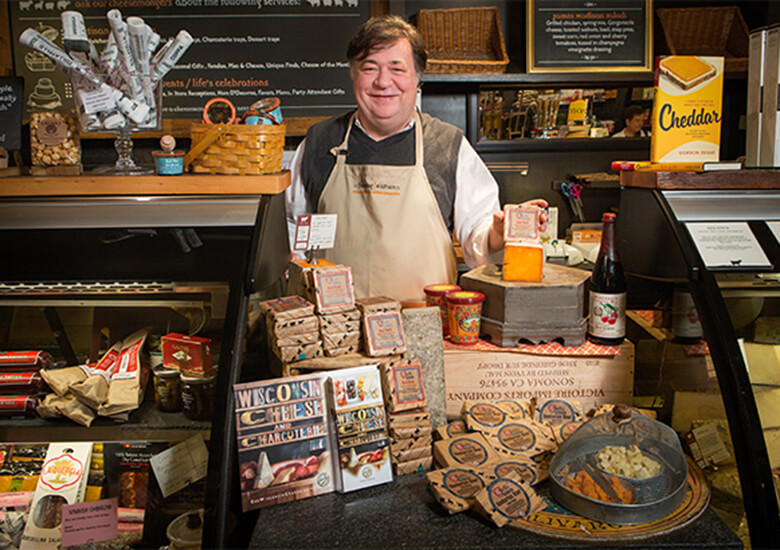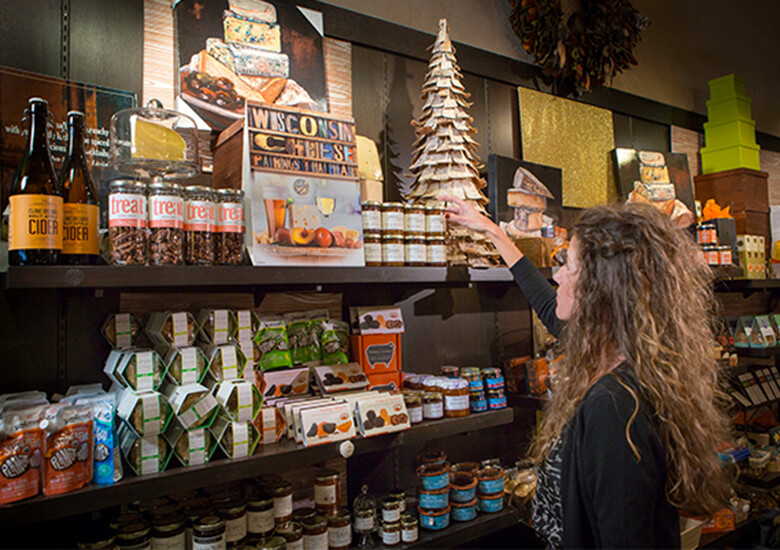Buying cheese sounds deceptively simple. You pick the cheese you want and you buy it—what’s complicated about that? However, as any cheese lover will tell you, standing in front of a counter filled to the brim with a dizzying assortment of cheese is both a blessing and a curse.
Soft or hard; milky or funky; aged or mild? There are too many options! This guide will equip you with all the knowledge you need to pick out the cheeses of your dreams. After all, sweet dreams is made of cheese.
The Basics of Talking to a Cheesemonger

Allow us to introduce you to your new best friend: the cheesemonger, who is conveniently located behind the counter of your local cheese shop or grocery store. These wonderful humans are experts in all things cheese and are there to answer any cheese-related questions you have (no matter how silly they might sound). To make your experience as smooth as possible, we’ve put together a list of tips on how to make the most of your visit to the cheesemonger.
Tip #1: Understand What Cheeses You Like
The best information you can offer your cheesemonger is what cheeses you’ve enjoyed in the past and what you enjoyed about them. For example, if you really loved an Apple Smoked Cheddar you got from Carr Valley Cheese, that gives them a helpful jumping off point for more recommendations. Don’t just stop at the names of the cheeses though.
Including details about what you liked about the flavor and texture is crucial so that the cheesemonger can run through their mental encyclopedia of similar cheeses.
If you’re struggling to find the right words to describe your love for cheese, fear not! Read our guide to cheese tasting so you can be prepped with the right vocabulary. If you’re like us, you’re eating a lot of cheese regularly. To give your brain a break, try keeping track of cheeses you really liked—or disliked—on your phone or in a notebook.
Tip #2: Don’t Be Afraid to Ask Questions (and for Samples)
Although you might feel pressured to avoid asking too many questions, remember that a key part of a cheesemonger’s job is to answer them—that’s why they’re there.While you’re there, don’t hesitate to ask for a sample too! Nearly all cheese shops will be more than happy to share a small sample of cheese with you. After all, tasting is the best way to see how much you’ll love that gouda you were eyeing in the back of the counter.
Don’t forget to share your thoughts in real-time to the cheesemonger so they can steer you toward something else if you’re not a fan. When asking questions, try to be as specific as possible. We recommend avoiding vague questions like, “what’s new in the shop today?” Cheese shops receive fresh shipments of dozens of cheeses every day, so this might not be particularly helpful information.
On the other hand, asking about seasonal offerings is a great way to see which cheeses are worth special attention.
Cheesemonger Tip: Seasonal Cheeses
Many must-try cheeses are only offered on a rotating, seasonal basis. Award-winning Rush Creek Reserve from Uplands Cheese is one such cheese, produced only in the fall. Why are some cheeses seasonal? As the seasons change, so does the flavor and properties of the milk cheesemakers use. Cheesemakers carefully time their work to take advantage of this to make limited edition, one-of-a-kind cheeses.
Tip #3: Keep an Open Mind
One of the most important ideas we can impart on a budding cheese lover is a willingness to step outside your comfort zone. With a whole universe of cheeses to explore, don’t let one negative experience sour your feelings toward an entire category of cheeses.
For example, some people may think they don’t like blue cheese—but there’s a huge range of blues out there that span everything from mild and creamy to sharp and crumbly. It’s okay if you don’t enjoy a given cheese, but we encourage you to always try something new to expand your cheesy horizons!
Other Tips for Buying Cheese

Buying the Right Amount of Cheese
Many shops have minimum orders that range from ¼ pound to ½ pound. We don’t know why anyone would ever want less cheese than that, frankly. If you’re buying cheese for a small gathering, most cheesemongers recommend buying enough cheese so that each person can have 1 oz per cheese per person, so if you get a variety of cheeses you’ll ideally end up with 3-5 ounces per person. This way everyone can have some cheese without fighting over the last piece.
Requesting Cheeses You Can’t Find Elsewhere
Another benefit of buying cheese from your local cheese shop is that they can special order cheeses you can’t find elsewhere! While many supermarkets opt to avoid carrying small-batch cheeses or ones with natural rinds, your local cheese shop is equipped to keep these cheeses fresh and sell them to eager cheese lovers like yourself. If your cheese shop doesn’t carry the cheese you’re looking for, just ask if they can special order it. Chances are good that they can.
Cheese Buying Tip
Want to make buying cheese even easier? You can get your favorite Wisconsin cheeses delivered right to your door with our continuously updated list of cheesemakers and retailers that allow you to order cheese online. Award-winning Wisconsin cheese is just a click away.
Answer All Your Cheese Related Questions

In past blogs, we’ve covered everything you need to know about cheese: from pairing cheese with wine, to cheese storage, and more. Start with our beginner’s guides or just dive into whatever topic suits your fancy. Explore a world of cheese at your fingertips.
The Basics
The Beginners Guide to Cheese Pairing
How to Store Cheese
Wine and Cheese Pairing
How to Pair Red Wine and Cheese
How to Pair White Wine and Cheese
How to Pair Rose with Cheese
Liquor and Cheese Pairing
How to Pair Cocktails and Cheese
How to Pair Brown Liquor and Cheese
Cheeseboard Essentials
How to Build A Perfect Cheeseboard
How to Pair Meats with Cheese
Conclusion
If all this talk of buying cheese has got you feeling hungry, you can try your hand at making our selection of over 300 handcrafted recipes featuring Wisconsin Cheese. Don’t forget to share your creation with us on Instagram or Facebook and become part of the largest cheese community in the world.
FAQs
Where is the best place to buy cheese?
The first place we’d recommend looking is your local cheese store. You’ll be supporting a local business and getting the best advice possible from experienced cheesemongers who can help you pick the right cheese for your palate. More importantly, you get samples—the best way to see if you like any given cheese. Pro-tip, most cheese shops carry a variety of specialty delights besides cheese—think fancy jams, olive oils, cured meat, and fine chocolate. A trip to a cheese shop is like Disneyland for foodies—you could get lost in all the goodness. If you’re not lucky enough to have a local cheese shop nearby, do not despair, many grocers have created a cheese shop vibe in their specialty department so you will still feel like you’re in a foodie paradise.
How do you choose cheese?
Choosing a cheese comes down to personal preference. In a perfect world, you would be able to taste the cheese before purchasing, but most cheese shops and grocery stores have suspended in-store sampling during the pandemic. If you can’t try a sample, ask for tasting notes and compare them against the types of cheeses you’ve historically enjoyed. Keeping a cheese journal with short notes on the cheese you’ve tried is a great way to make this easy.
